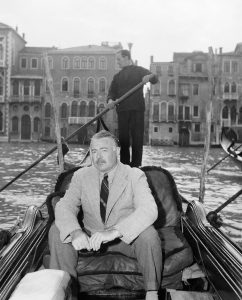Michael Mewshaw in the Washington Post:
 Ernest Hemingway influenced generations of writers with his terse, understated prose, his stoic code of grace under fire and his commitment to producing a strict number of pages each day. In his private life, he showed no such discipline. Married four times and chronically unfaithful, a prodigious drinker and gourmand whose weight ballooned to 240 pounds, a man of savage mood swings, alternately bellicose and sloppily sentimental, a blowhard and relentless self-promoter who claimed to crave privacy, he passed himself off as an icon of machismo, yet wrote a novel, “The Garden of Eden,” rife with cross-dressing and gender fluidity. It would have taxed Sigmund Freud and all his psychoanalytic acolytes to tease out the implications of Hemingway’s rigorous literary standards and his slovenly personal style.
Ernest Hemingway influenced generations of writers with his terse, understated prose, his stoic code of grace under fire and his commitment to producing a strict number of pages each day. In his private life, he showed no such discipline. Married four times and chronically unfaithful, a prodigious drinker and gourmand whose weight ballooned to 240 pounds, a man of savage mood swings, alternately bellicose and sloppily sentimental, a blowhard and relentless self-promoter who claimed to crave privacy, he passed himself off as an icon of machismo, yet wrote a novel, “The Garden of Eden,” rife with cross-dressing and gender fluidity. It would have taxed Sigmund Freud and all his psychoanalytic acolytes to tease out the implications of Hemingway’s rigorous literary standards and his slovenly personal style.
“Autumn in Venice: Ernest Hemingway and His Last Muse” focuses on the final turbulent decade of a life, but Andrea di Robilant captures the full panoply of quirks and conflicts that often made Papa and those closest to him miserable. Lovers, ex-wives, friends, publishers, even complete strangers were forced to dance to the tune he piped. (Di Robilant portrays a hilarious scene of Hemingway hounding the man beside him on an airplane to read his manuscript and agree that it was a masterpiece.) Still, di Robilant, an Italian American with deep roots in Venice and relatives who were part of Papa’s crowd, never fails to empathize with the aging author’s predicament. Staring down the gun barrel of his 50th birthday, Hemingway brooded about his health, his eroding powers and the opinion of critics that he was finished.
More here.
